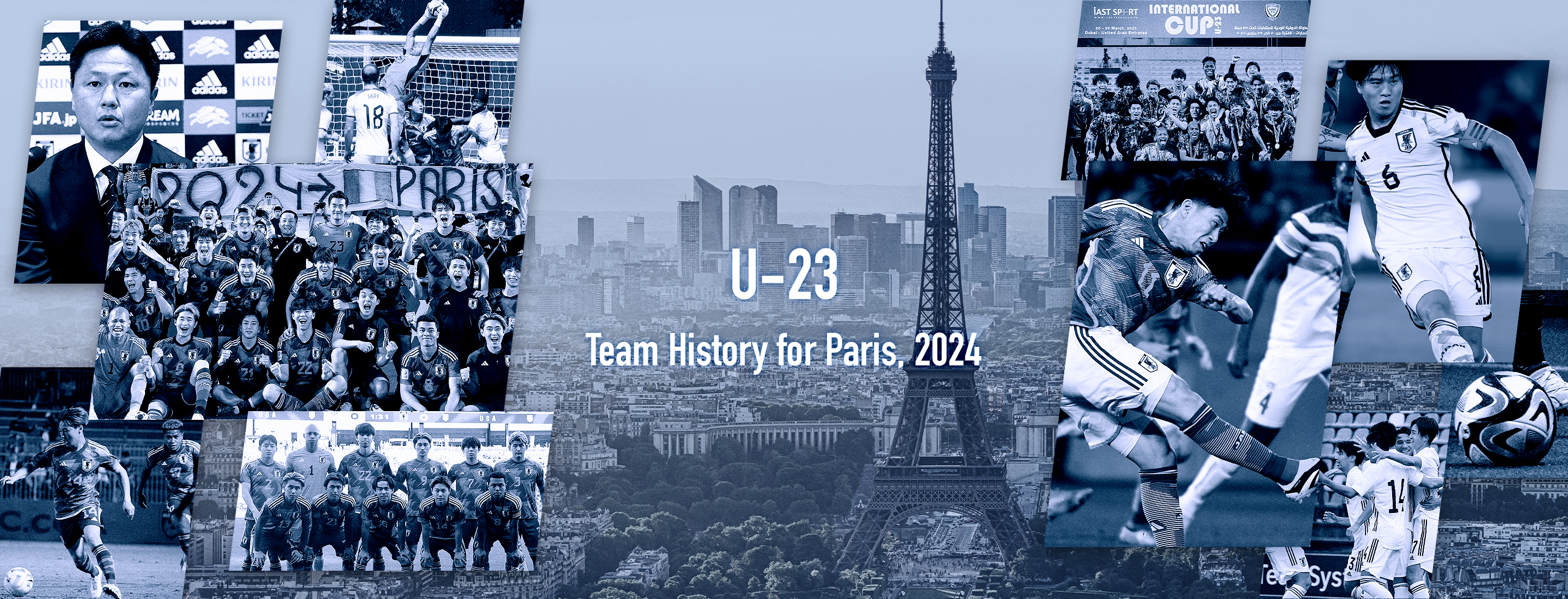
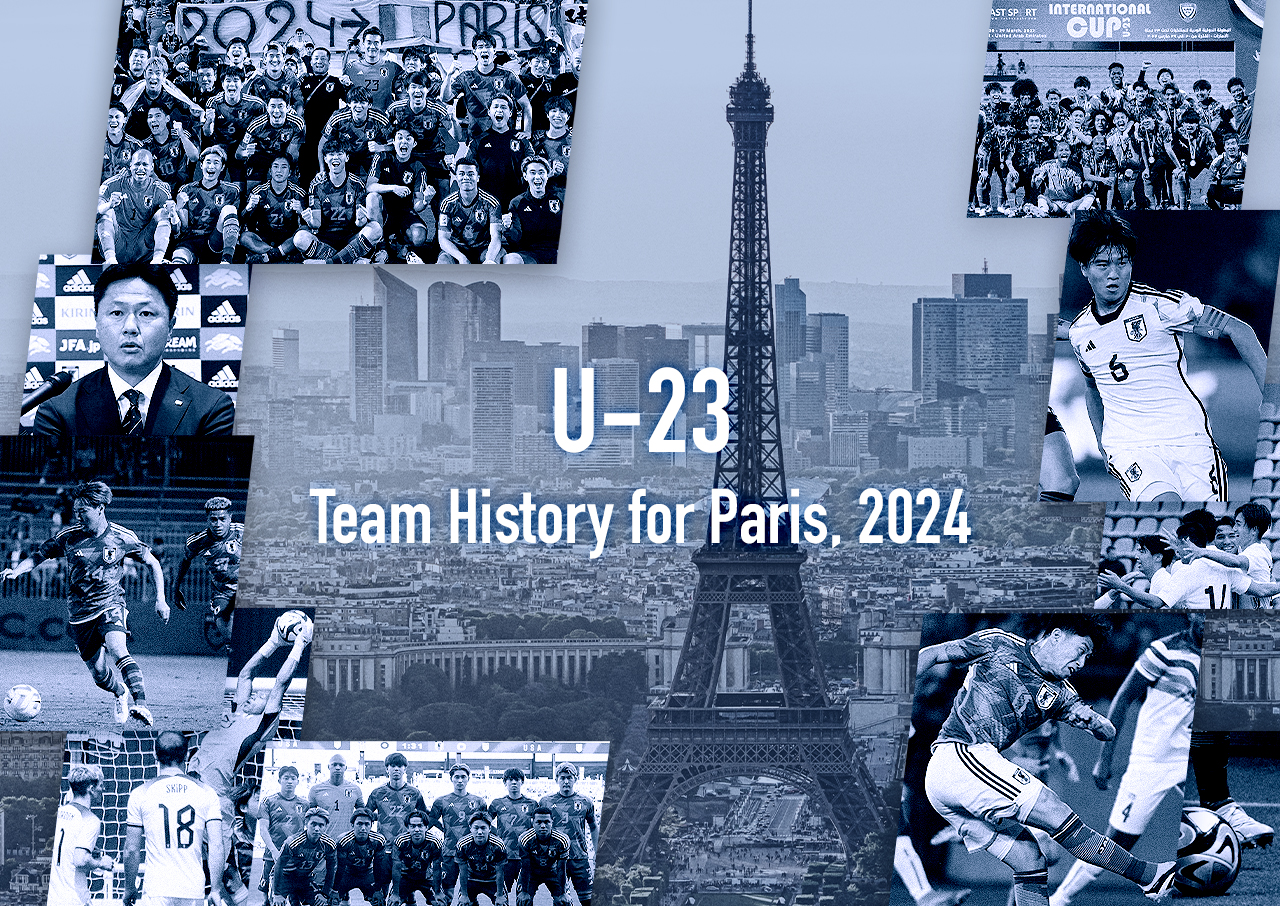
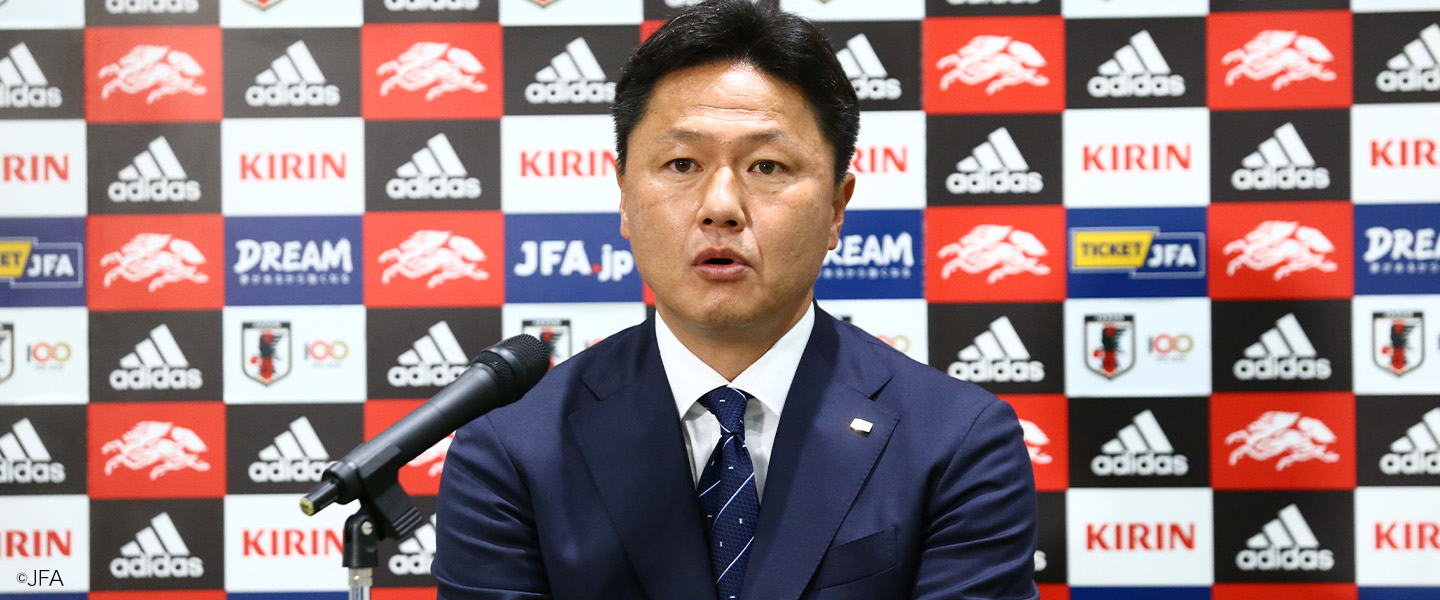

OIWA Go, who was in charge of the U-18 Japan National Team, was appointed head coach of the U-21 Japan National Team as they prepare to qualify for Paris 2024. Having served as head coach of Kashima Antlers for almost two and a half years from June 2017, leading the club to the AFC Champions League title in 2018, he explained what was expected of his appointment: “My experience of competing in Asia and against European and South American clubs at the FIFA Club World Cup™, as well as against Central American clubs during my time at Kashima, is part of what is expected of me for the team.” He also spoke enthusiastically about his ambitions: “There are no games that the Japan National Team can afford to lose. I want to build a team that the fans and supporters can enjoy and cheer for, while we focus on winning each and every game in front of us.” The coaching staff includes HANEDA Kenji as assistant coach, HAMANO Yukiya as GK coach and YANO Yoshiharu as physical coach.
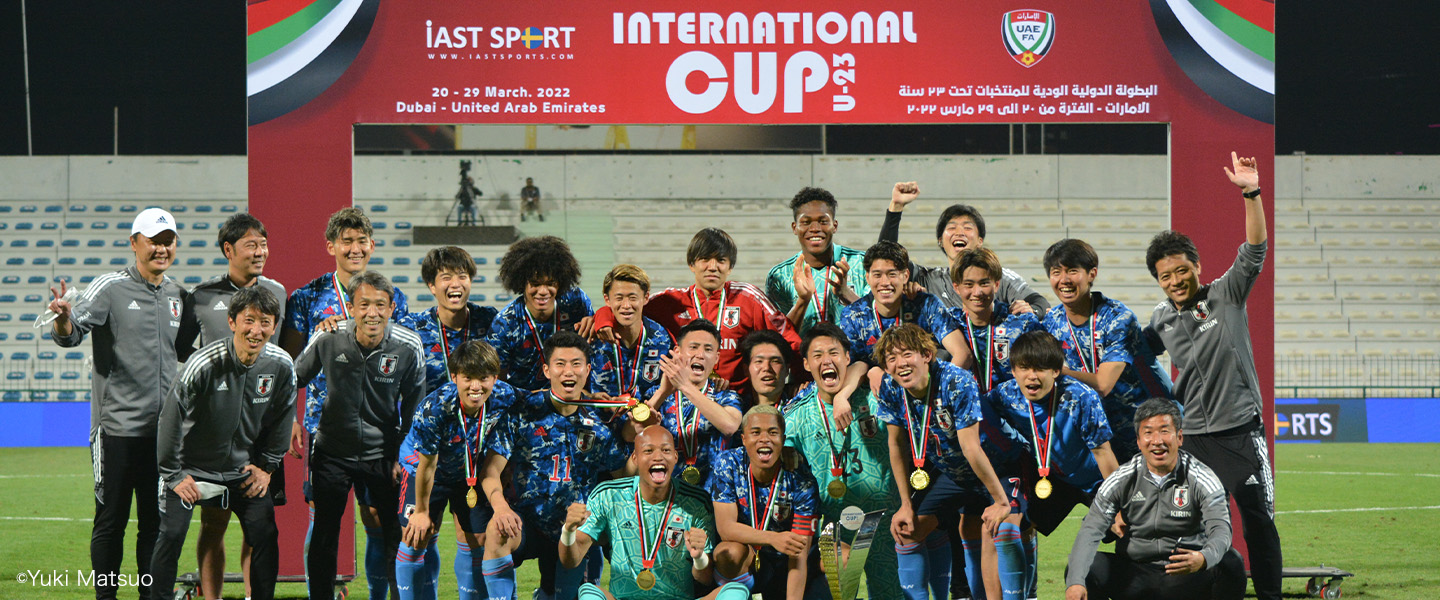

The team's first campaign in preparation for Paris 2024 was the Dubai Cup U-23 in the United Arab Emirates. A total of 25 players from domestic and overseas clubs were called up for the tournament on a tight schedule, but coach Oiwa said it was the national team's mission to overcome difficult conditions and demanded toughness from the players. In their first match against Croatia, ODA Yutaro scored the winning goal after receiving a pass from ARAKI Ryotaro to give the team a 1-0 victory. In their next match against Qatar, three days after the first, the team made eight changes to their line-up but still managed to win thanks to goals from SAITO Koki and YAMAMOTO Rihito, as the players embodied their coach’s words of “playing Japan National Team’s brand of football, no matter who is on the pitch.” Six players had to return home early ahead of the final against Saudi Arabia, but coach Oiwa remained calm: “These things can happen to the national team. We will deal with the situation with the players who are still available.” In the final, HOSOYA Mao scored from Yamamoto's corner to give Japan a 1-0 victory over the Asian giants. The team's coordinated pressing and set-pieces, which had been a focus of training during the tour, paid off with a successful result and a fruitful tournament for the team.
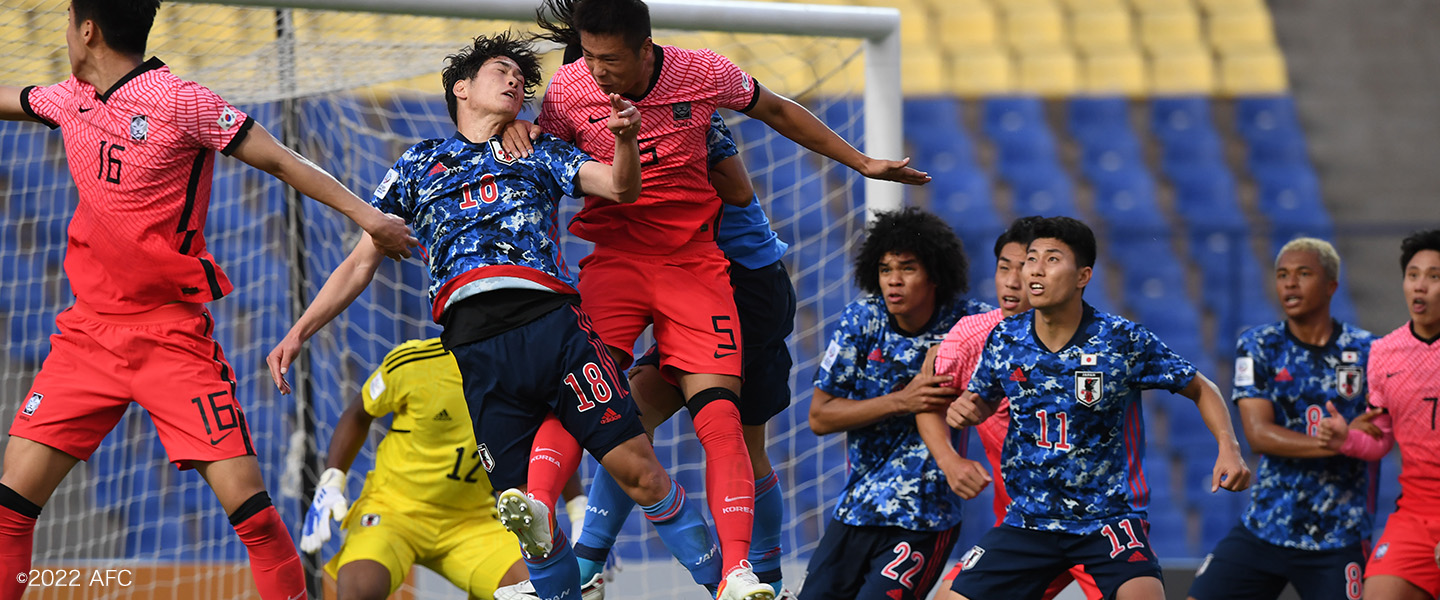
Although the tournament was categorised as a U-23 tournament, Japan were represented by their U-21 side, who were aiming to qualify for Paris 2024. After a 2-1 win over the United Arab Emirates in their opening match, they drew 0-0 with Saudi Arabia. This was followed by a 3-0 win over Tajikistan to finish second in Group D and progress to the quarterfinals. And against their “older” rivals, Korea Republic, the team demonstrated their capabilities to the fullest, scoring three times en route to a convincing victory. However, in the semi-final against hosts Uzbekistan, their fifth match in a row on two days' rest, they were unable to reach their full potential, partly due to having one less day to prepare than their opponents. The team's performance was lacklustre from the outset, resulting in a 0-2 defeat. It was the first defeat for the team since its inception. In the third-place match, however, the team demonstrated the “rebound mentality” that coach Oiwa had called for, with all 23 players contributing from their respective positions to a 3-0 win over Australia.
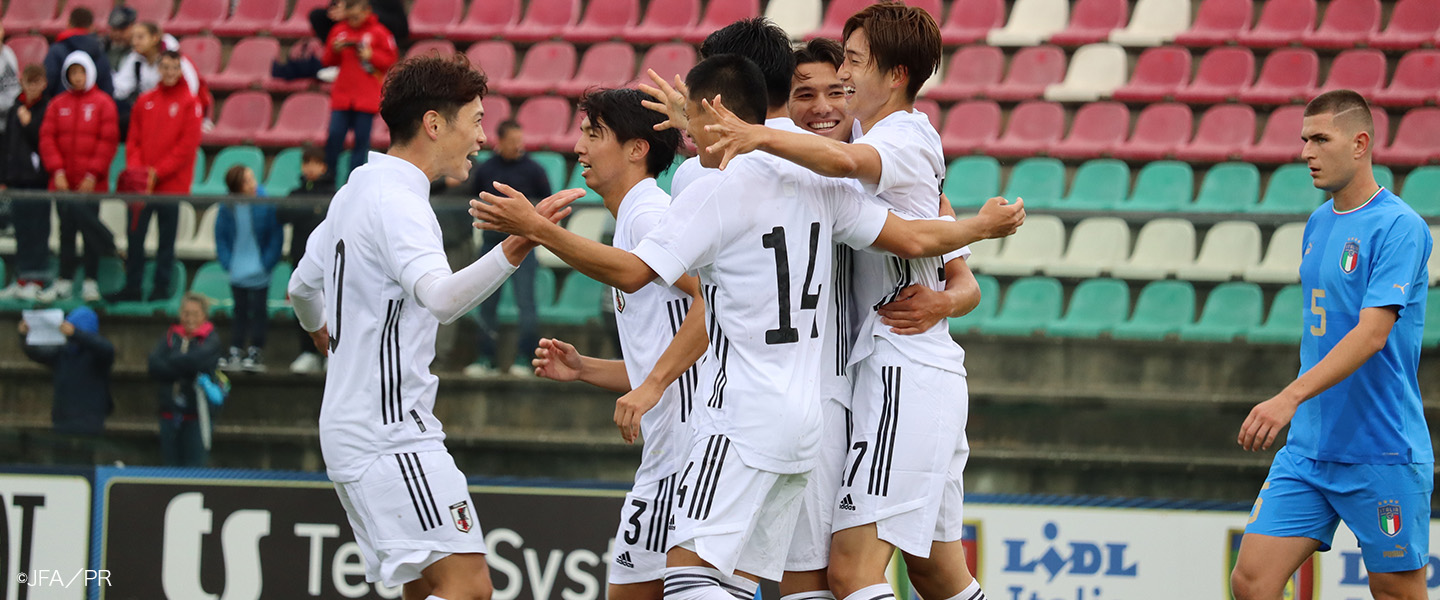
In September 2022, in their first activity in three months, the U-21 Japan National Team went on a European tour, playing international friendlies against Switzerland and Italy in Spain and Italy respectively. The match against Switzerland, Japan's first encounter with a European side since the Dubai Cup U-23 match against Croatia, was a difficult one, with Japan conceding a goal from a corner in the ninth minute. In the 15th minute, first-time call-up OHATA Ayumu won the ball before passing it to SAITO Koki, who played a through ball to setup HOSOYA Mao for a one-on-one against the goalkeeper, in which the striker calmly converted. However, Japan conceded again in the 48th minute and despite creating several more opportunities, they went on to lose the match 1-2. After the match, coach Oiwa stressed the need for the team to reflect on their defensive strategy against set-pieces and to adapt their play according to the different phases of the game. In the subsequent match against Italy, which took place four days later, the team demonstrated their ability to address and resolve these issues. Japan struggled to apply pressure against Italy in the first half and eventually conceded the opening goal in the 39th minute through a mistake forced by their opponents' intense pressure. In the second half, however, a change of players and system from 4-3-3 to 4-2-3-1 helped Japan get back into the game, and a header from FUJIO Shota in the 56th minute brought them back on level terms. Following the conclusion of the match in a draw, Japan brought their series of matches against formidable opponents, who were both preparing for the UEFA European Under-21 Championship, to a close with a draw and a defeat.
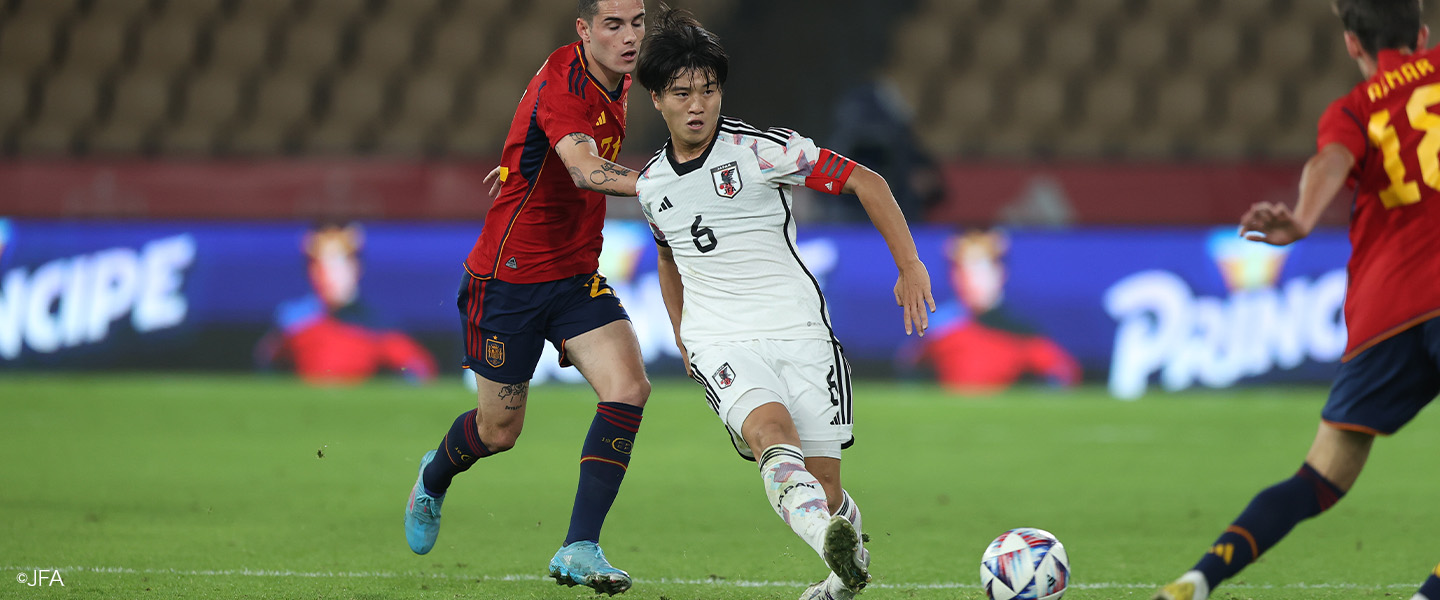
In November 2022, the same month the FIFA World Cup Qatar 2022™ was held, the U-21 Japan National Team embarked on their second European tour of the year. Since the team's inception, coach Oiwa has used the slogan “Going to Paris 2024 via SAMURAI BLUE (Japan National Team)” to encourage the players to strive for higher standards. On the occasion of this tour, he reiterated this slogan by saying: “In four years' time, you must all play a leading role (in the Japan National Team).” The first half against Spain was evenly contested, but two goals were conceded in the second half. Especially after the first goal, the team looked overwhelmed by their opponents' passing, which raised concerns about the team's play when trailing. Against Portugal, ODA Yutaro scored the opener in the first half. In the second half, FUJIO Shota conceded a penalty for handball, but redeemed himself with a goal in additional time to give Japan the win. “I was hoping the players themselves would realise they needed to improve, and I think they have,” said coach Oiwa, summing up the two matches against strong nations.
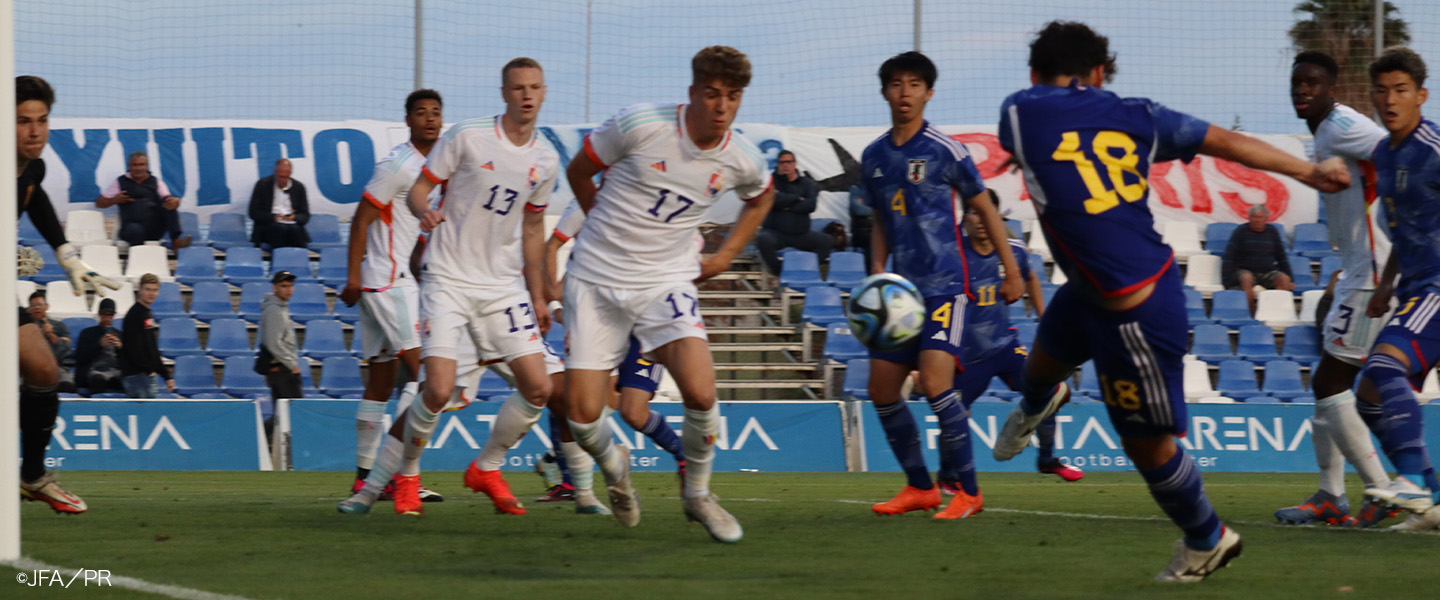

The first activity of 2023 was the third European tour for the Paris 2024 generation. BANGNAGANDE Kashif and HANDA Riku were called up to the SAMURAI BLUE (Japan National Team), who were also active during this period, and the U-22 Japan National Team had five players called up from overseas clubs, the most since the team's inception. Coach Oiwa viewed the situation positively, saying that the player pool is steadily increasing. Against Germany, the team conceded the opening goal from a penalty in the first half. However, they showed their resilience by equalising soon after when SATO Kein scored from a corner. Japan took the lead early in the second half when Sato assisted HOSOYA Mao's goal. Despite conceding an equaliser a few minutes later, the team began the tour on a par with one of Europe's powerhouses. After making seven changes to their line-up, Japan had to fight hard in the early stages of the match against Belgium, and although they made mistakes in the fifth and 20th minutes that cost them goals, they made some adjustments in the second half, including a system change from a 4-3-3 to a 3-4-2-1, which paid immediate dividends. The team stabilised their defence with a man-to-man approach and increased their attacking opportunities, with Sato scoring from a corner in the 54th minute and SUZUKI Yuito scoring from a short counterattack in the 64th minute. Despite conceding the decisive goal in the 86th minute through yet another error and losing 2-3, it was a match from which the team took many positives, as coach Oiwa reflected: “It's great that we are scoring goals.”
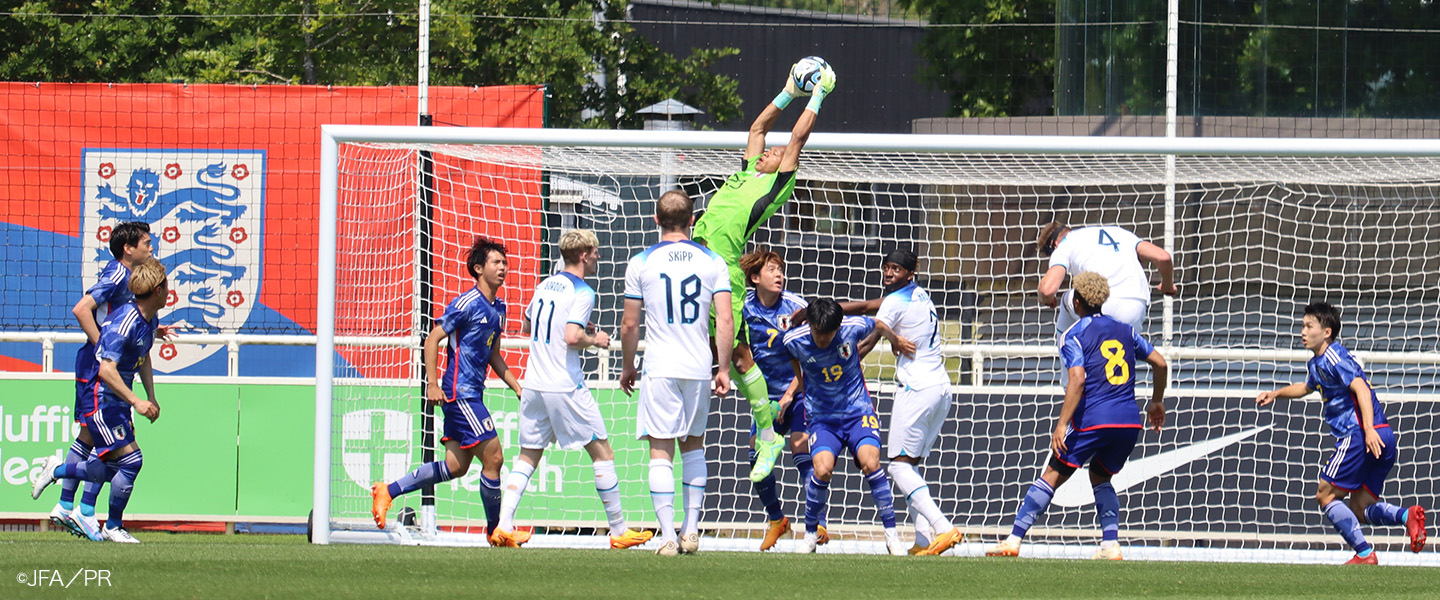
As their final activity before the AFC U23 Asian Cup Qatar 2024™ Qualifiers in September, the U-22 Japan National Team toured Europe for the fourth time. The opening match of the tour was held behind closed doors, with the England team engaged in preparations for the UEFA European Under-21 Championship. Japan displayed a robust performance against an England side that was not at full strength, securing a 2-0 victory. After the match, coach Oiwa praised his side's ability to execute plays with intent at both ends. In the subsequent match against the Netherlands, Japan initially struggled to gain control of the game but demonstrated remarkable resilience and adaptability to turn the tide and assert dominance in the second half. Despite a goalless draw, the coach commended the team's defensive performance, noting: “We played with determination and tenacity.” He also highlighted areas for improvement on the attacking front, saying: “We need to work on moving the ball with confidence from the first half.”
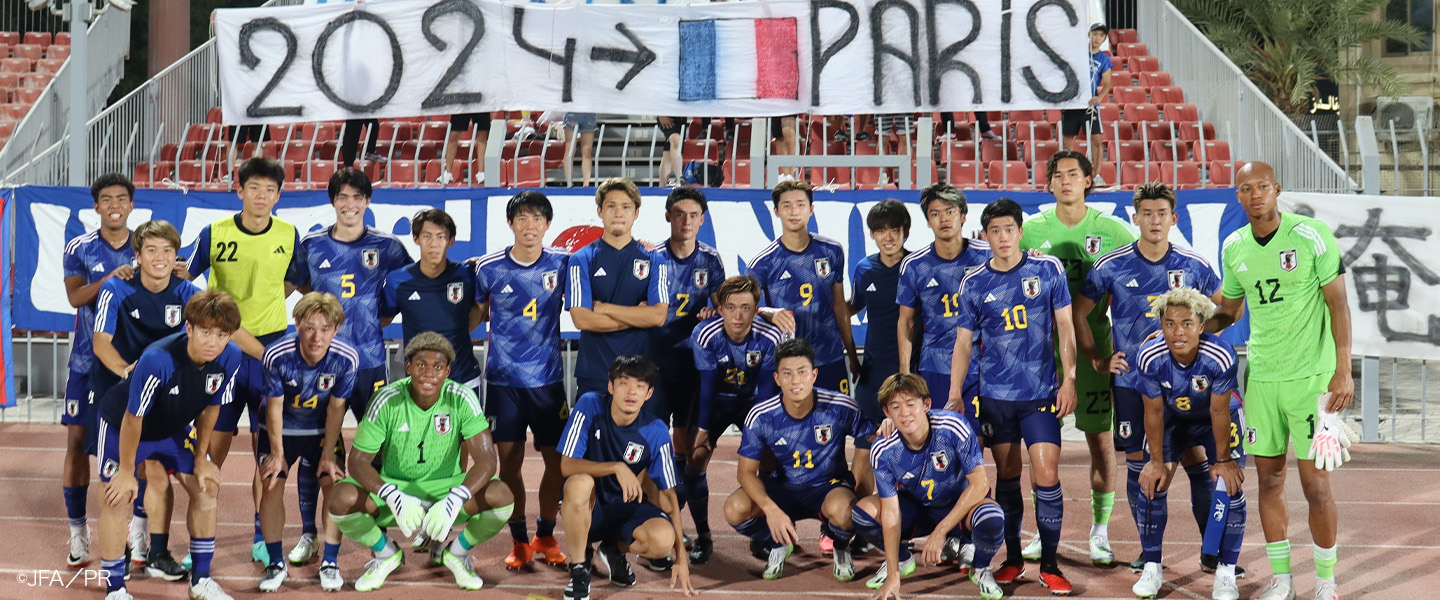
The AFC U23 Asian Cup Qatar 2024™ Qualifiers took place in Bahrain. The competition had a direct bearing on Japan's qualification for the Olympic Games, with the AFC U-23 Asian Cup doubling as a qualifier for Paris 2024. Japan fielded a 23-man squad that included players who have been with the team since its inception, as well as MATSUKI Kuryu and TAKAI Kota, who played at the FIFA U-20 World Cup Argentina 2023™ in May. Japan won their first match 6-0 against Pakistan, their second 1-0 against Palestine and although their third match against Bahrain ended 0-0, they finished top of the group with seven points and qualified for the U23 Asian Cup. A key turning point came in their second match against Palestine, who had beaten Bahrain in their first match. Against a defensive-minded opponent, Japan boldly exploited the space on the flanks of the penalty area, which paid dividends in the 23rd minute when ODA Yutaro latched onto YAMAMOTO Rihito's through ball before sending a cross into the path of FUJIO Shota for the decisive goal.
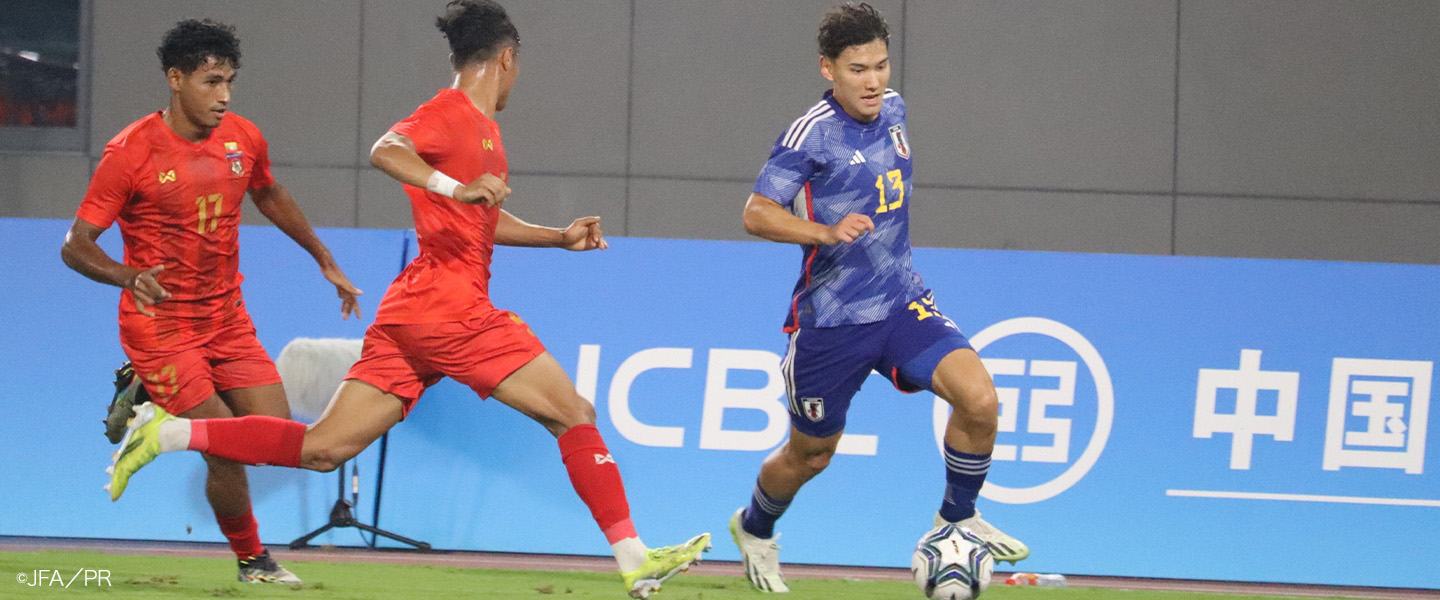
A week after the AFC U23 Asian Cup Qatar 2024™ Qualifiers, the Asian Games opened in Hangzhou, China. Japan fielded a 22-man squad, 10 of whom were university students. After beating Qatar 3-1 and Palestine 1-0 to progress from the group stage, Japan continued their steady progress through the knockout stages with a 7-0 win over Myanmar, a 2-1 victory over DPR Korea and a 4-0 win over Hong Kong. In the final against Korea Republic, it was Japan who took the lead in the second minute when UCHINO Kotaro converted the loose ball of SATO Kein's cross. However, they were subsequently outplayed by Korea Republic, a team that had called up players from overseas clubs and made use of overage players. Unable to withstand their opponents' pressure, Japan conceded goals in the 27th and 56th minutes to lose the match 1-2. Despite the defeat, coach Oiwa praised the progress made by his players, saying they had become a better team as the tournament progressed and that the series of tough matches against their Asian rivals had been a valuable experience for the youngsters.
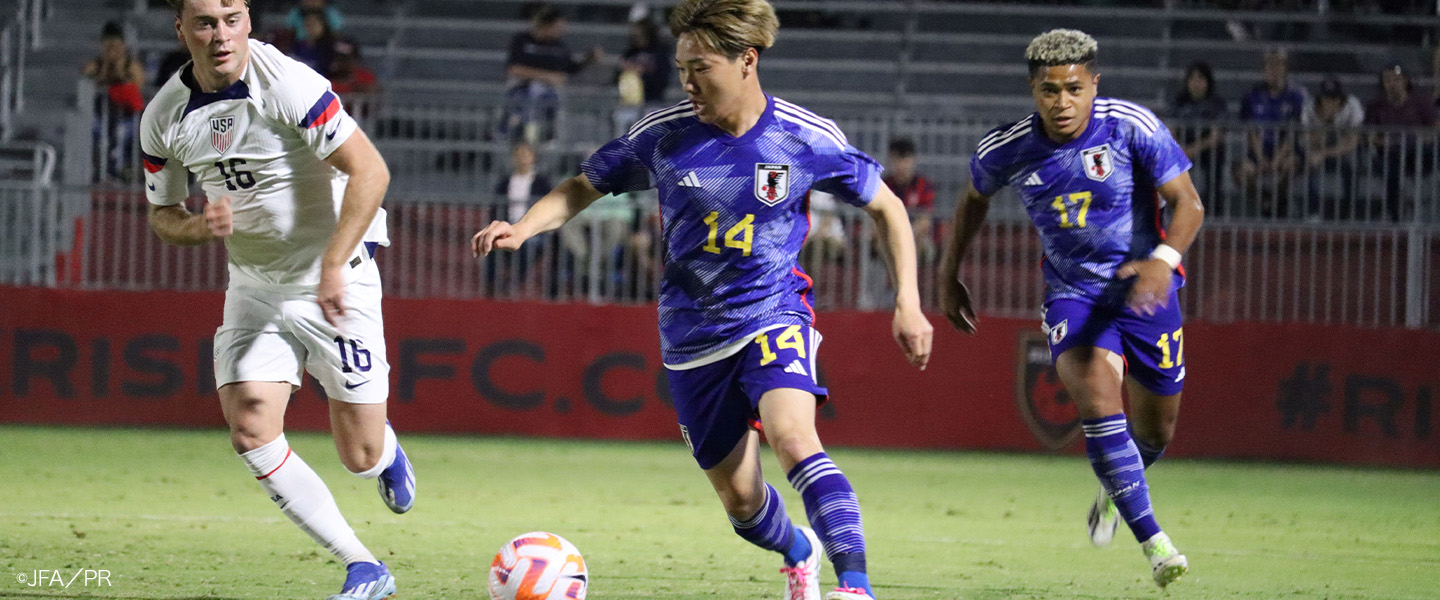
The U-22 Japan National Team have gained experience by playing many European and Asian sides, but this was the first time they had faced teams from the Confederation of North, Central America and Caribbean Association Football (CONCACAF). Mexico took the initiative in the early stages of the first match, but it was Japan who opened the scoring in the 14th minute when HOSOYA Mao stole the ball from an opposing defender and scored. Building on the momentum from their opening goal, Japan continued to apply pressure and create chances, scoring four goals in the process, with Hosoya scoring his second in the 20th minute, SUZUKI Kaito in the 81st minute and UCHINO Kotaro, who had joined the team as an additional call-up, in the 82nd minute. Despite conceding a goal in the 73rd minute, Japan went on to defeat Mexico 4-1 in convincing fashion. In the following match against the USA, the team rotated five starters from the Mexico match, but struggled against their opponents’ athleticism and speed. After conceding the opener to the USA, Japan once equalised with the goal of MATSUKI Kuryu, but gave up three more goals afterwards to lose the match 1-4. It was the most goals conceded by the team since its inception. “It's your own strength that comes out in the match. We can't turn our backs on it, so let’s use it as a good lesson for the next time,” coach Oiwa told the players, vowing to use the bitter experience as a source of growth.
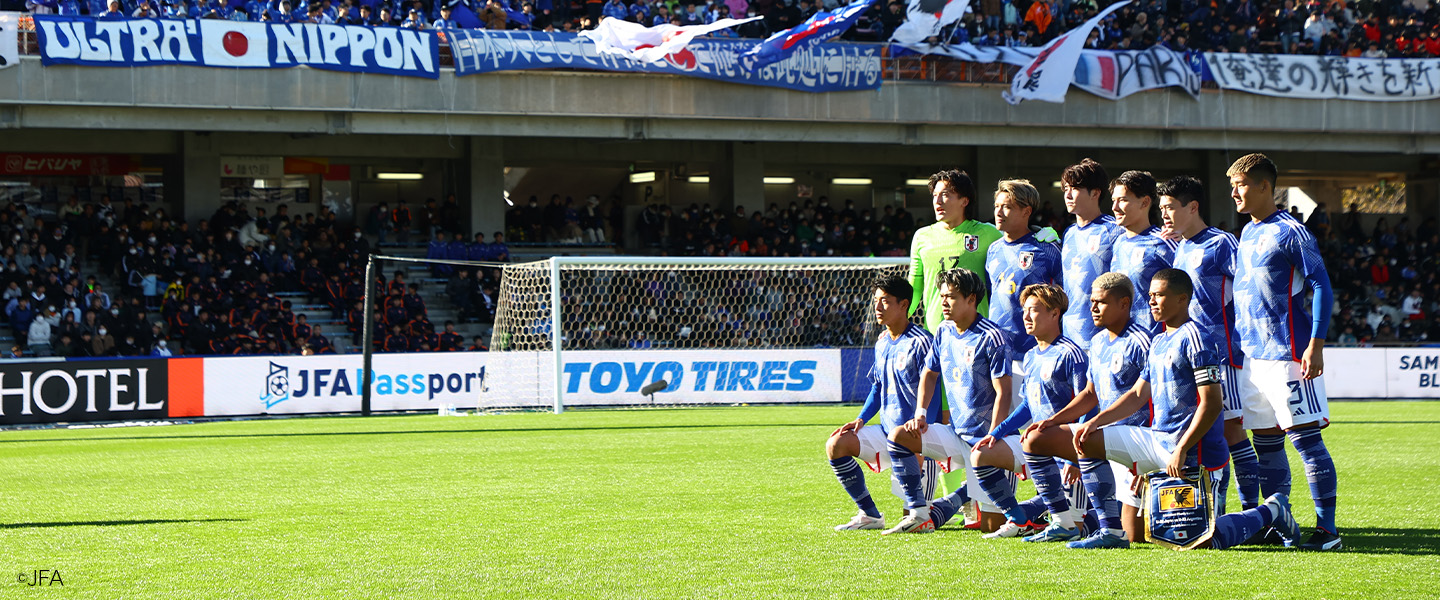
The first domestic match of the Paris 2024 generation took place in coach Oiwa's hometown of Shizuoka. Their opponents were South American giants Argentina. It was the first time the team had played against a South American side, but Japan were undaunted and played with great aggression. The home side took the lead in the 18th minute when SATO Kein latched on to a pass from MATSUKI Kuryu to score the opener. Argentina responded immediately, capitalising on a lapse in the Japanese defence to equalise and take the lead early in the second half from a direct free-kick. After that, however, it was all Japan. SUZUKI Yuito scored back-to-back goals in the 66th and 75th minutes, both from passes by HANDA Riku. MATSUMURA Yuta and FUKUDA Shio scored in the 81st and 88th minutes respectively to give Japan a 5-2 victory over their formidable opponents. After the match, coach Oiwa reflected on the team's performance and pointed out the need for further development, saying: “It's great that we were able to show our colours, but there were times when we struggled to take control of the game.” Three days later, the team played another friendly against Argentina, this time behind closed doors, which ended in a scoreless draw.
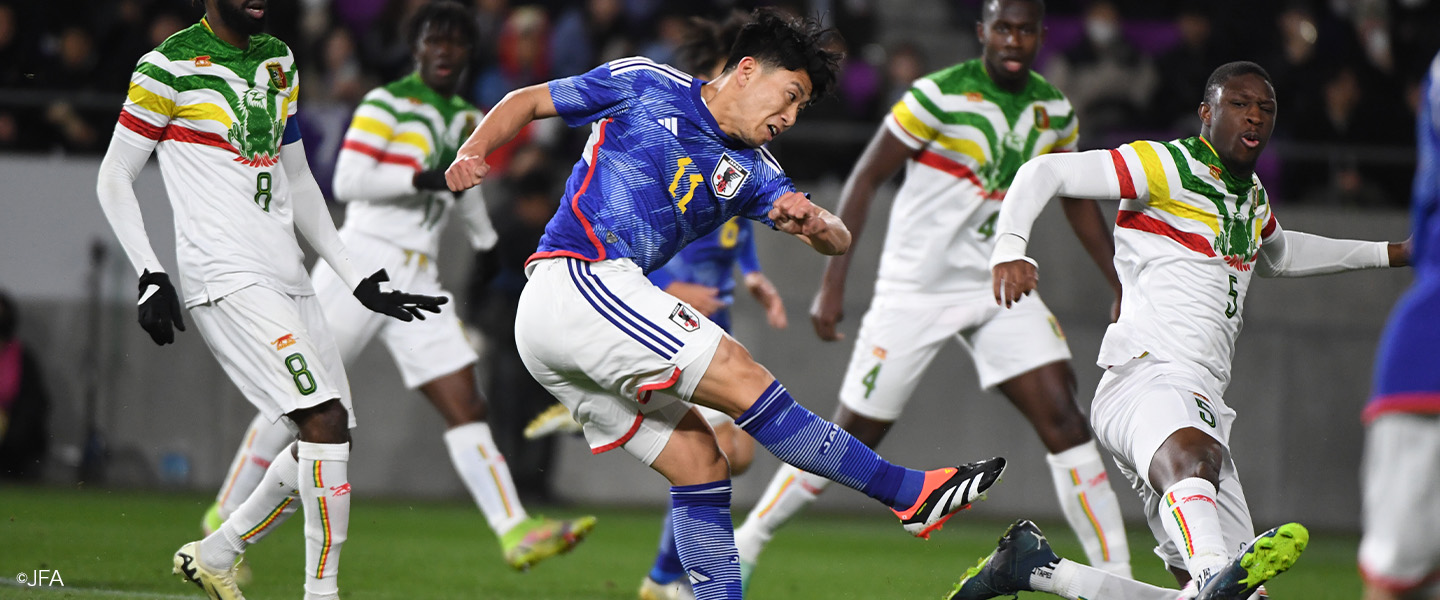

In their first action of the Olympic year, Japan faced Mali and Ukraine, who had already qualified for the Olympic Games as representatives of Africa and Europe respectively. It was also the final activity before the AFC U23 Asian Cup and an important opportunity to assess the squad. The match began with Japan taking the lead in the second minute when HIRAKAWA Yu converted a loose ball induced by a free-kick delivered by YAMADA Fuki. However, facing an African side for the first time, the players struggled to adapt to their opponents' athleticism and tempo, especially in the early stages, leaving them on the back foot and prone to mistakes. After conceding a goal in the first half and two more in the second, Japan went down 1-3. In contrast, the match against Ukraine, played on a two days’ rest to simulate the qualifiers and the main tournament, saw the team rotate 10 starters from the Mali game and produce a completely different performance. They moved the ball around aggressively and scored two second-half goals through SATO Kein and TANAKA Satoshi to win 2-0. Reflecting on the series, coach Oiwa praised his side's efforts, saying: “The players showed great attitude, commitment and did their job to play a solid game. To be honest, it will be difficult for me to select 23 players from this group.”
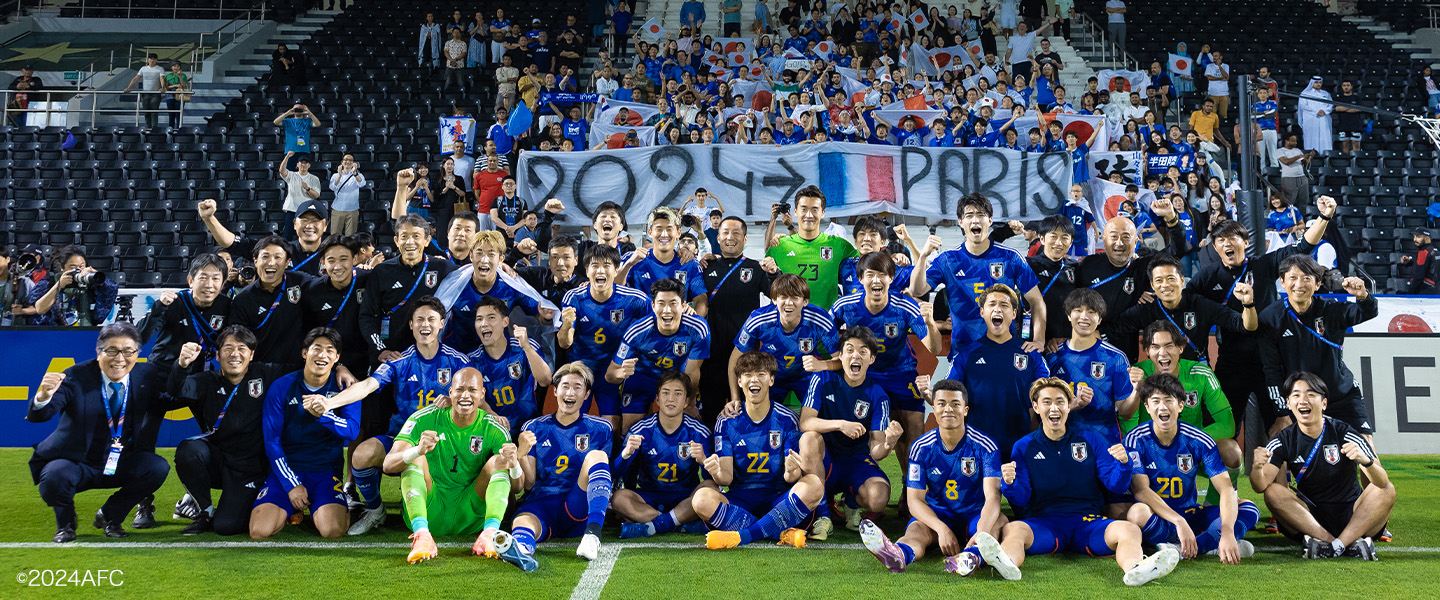
Originally scheduled to take place in January, the tournament was moved to April while the respective leagues were still running, limiting the number of players available for selection. Only five overseas players were called up, but coach Oiwa expressed his determination to qualify for Paris 2024, saying: “This is the best we can do at the moment.” In their first match against China PR, despite taking the lead through a goal by MATSUKI Kuryu, Japan were forced to endure a tough match after NISHIO Ryuya was sent off in the 17th minute but managed to hold on to win 1-0. They won their second match against the United Arab Emirates 2-0, lost their third against Korea Republic 0-1, but won their quarterfinal against Qatar 4-2 in extra time to set up a semi-final against Iraq, where victory would seal a trip to Paris. HOSOYA Mao opened the scoring in the 28th minute after being played through by ARAKI Ryotaro, and Araki found the back of the net in the 42nd minute after receiving the final pass from FUJITA Joel Chima to give Japan a two-goal lead. Iraq came back strongly in the second half, but a focused defence led by goalkeeper KOKUBO Leo Brian kept their opponents scoreless as they successfully qualified for their eighth consecutive Olympic Games. In the final against Uzbekistan, Japan were under intense pressure from the outset, but the team countered with tenacious defence and quick transitions between offence and defence. YAMADA Fuki's left-footed shot in additional time of the second half proved to be the decisive goal as Japan claimed their first AFC U23 Asian Cup title since the 2016 edition. “I would like to commend the players for making their own decisions on what they wanted to do while assessing the situation,” said coach Oiwa, who praised the players for fighting to the end despite facing an uphill battle.
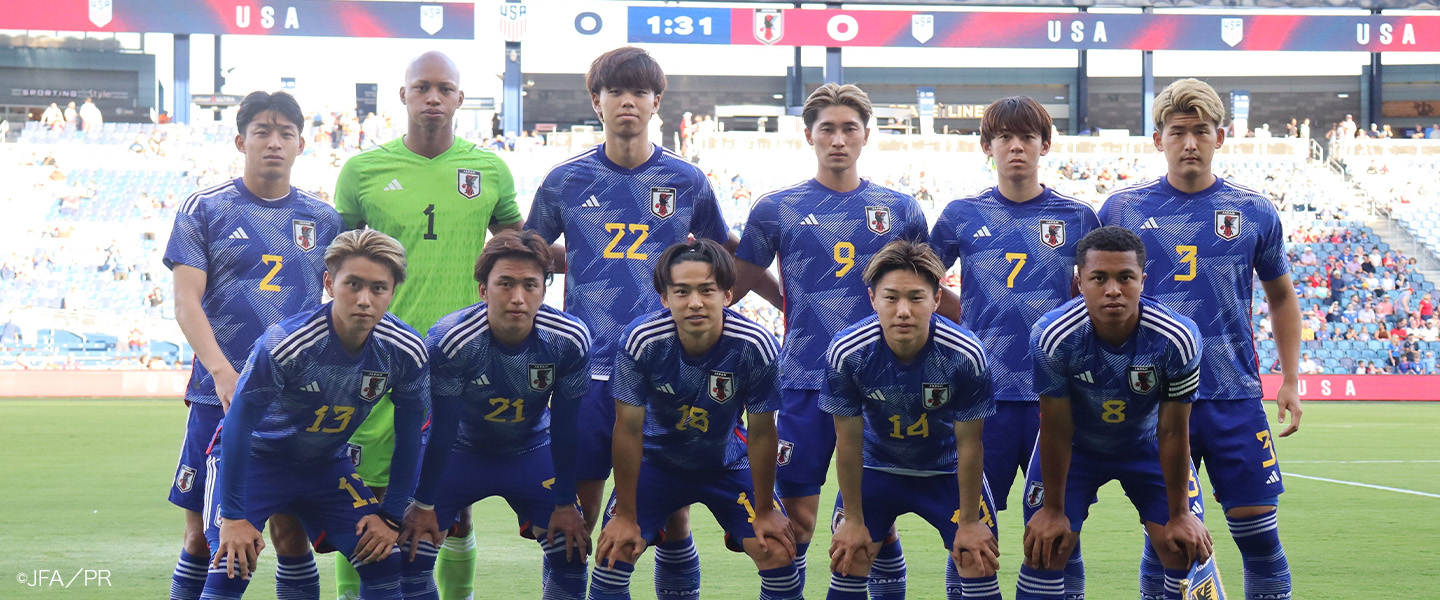
Japan played an international friendly against the USA, who they had played and lost to in October the previous year. Two matches were played between the teams that qualified for Paris 2024, with the first match being played behind closed doors and Japan winning the second 2-0. Despite their opponents fielding a team designed for the Olympics with over-age players, Japan demonstrated their dominance from the outset. Their strategy, which incorporated high pressure, short counters and cross-field passes, enabled them to maintain control of the game and secure a comfortable victory, with FUJIO Shota and HOSOYA Mao providing the goals in the sixth and 69th minutes respectively. This was the final national team activity prior to the announcement of the Paris 2024 squad. Following their recent absence from the team's activities due to club commitments, SAITO Koki and MITO Shunsuke were selected for the first time in a while, while SANO Kodai was selected for the first time. Reflecting on the series of matches, coach Oiwa commented: “These two matches have been fruitful in many ways. It allowed us to go over the team’s tactical and technical aspects, as well as the emotional aspects of the players.”